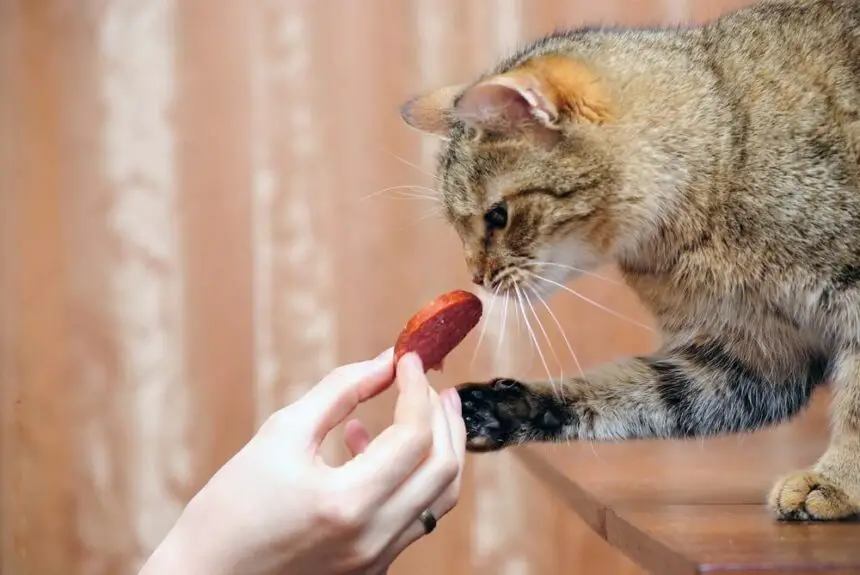As cat owners, we always strive to provide the best care and nutrition for our feline friends. However, it can be challenging to resist those pleading eyes and curious sniffs when our cats show interest in human food, such as chorizo. Chorizo, a highly seasoned sausage typically made from pork, is a popular ingredient in many dishes. But can cats eat chorizo? In this article, we will delve into the safety and nutritional impact of feeding chorizo to cats, shedding light on whether it should be included in their diet or strictly avoided.
Understanding a Cat’s Dietary Needs
Before we explore the potential effects of chorizo on cats, it’s essential to understand their dietary requirements. Cats are obligate carnivores, which means their bodies are designed to thrive on a diet primarily consisting of animal protein. Unlike humans and some other animals, cats have specific nutritional needs that must be met to ensure their overall health and well-being.
Key Nutritional Considerations for Cats
Protein: Cats require high-quality animal protein as the foundation of their diet. Protein is vital for their growth, maintenance of muscle mass, and various metabolic processes.
Taurine
Taurine is an essential amino acid for cats that helps support their heart health, vision, and reproductive system. Unlike humans, cats cannot produce sufficient amounts of taurine on their own and must obtain it through their diet.
Fats
Cats need healthy fats for energy, the absorption of fat-soluble vitamins, and the maintenance of healthy skin and coat.
Minerals and Vitamins
Cats require specific minerals and vitamins, such as calcium, phosphorus, vitamin A, and vitamin D, to support their overall health and prevent deficiencies.
Now that we understand the basic nutritional requirements of cats, let’s evaluate whether chorizo can be safely incorporated into their diet.
The Potential Risks of Feeding Chorizo to Cats
High Fat Content
Chorizo is typically high in fat, which can lead to digestive upset, pancreatitis, and obesity in cats. Feline pancreatitis is a severe condition that requires immediate veterinary attention and can be life-threatening.
Salt and Sodium
Chorizo often contains high levels of salt and sodium, which can be detrimental to a cat’s health. Excessive salt intake can lead to dehydration, electrolyte imbalances, and kidney issues.
Spices and Seasonings
Chorizo is heavily seasoned, usually with ingredients like garlic, onion, and paprika. Garlic and onion are toxic to cats and can cause damage to their red blood cells, leading to anemia. Moreover, the spicy nature of chorizo can irritate a cat’s digestive system.
Allergies and Intolerances
Cats can develop allergies or food intolerances to various ingredients, including those found in chorizo. These can manifest as gastrointestinal issues, skin problems, or respiratory distress.
Considering these potential risks, it is advisable to err on the side of caution and refrain from feeding chorizo to your feline companion. The negative consequences outweigh any potential benefits, if there are any at all.
Alternative Treats for Cats
While it’s important to avoid feeding chorizo to cats, there are numerous safe and healthy alternatives that can be incorporated into their diet or used as occasional treats:
High-quality commercial cat food
Opt for nutritionally balanced cat food formulated to meet your feline friend’s specific needs. Look for options that prioritize animal protein sources and do not contain harmful additives or fillers.
Cat-friendly meat treats
If you want to offer your cat a treat, choose lean, unseasoned meats like cooked chicken, turkey, or fish. Make sure to remove any bones, skin, and seasoning before serving. These protein sources are more suitable for your cat’s digestive system and provide essential nutrients.
Cat-safe fruits and vegetables
Some cats enjoy small amounts of cat-friendly fruits and vegetables, such as cooked pumpkin, steamed carrots, or sliced apples (without seeds or cores). However, keep in mind that fruits and vegetables should only be offered as occasional treats and should not replace a cat’s primary diet.
Commercial cat treats
There are plenty of commercially available cat treats specifically designed to meet feline nutritional needs. Look for treats made from high-quality ingredients, without added spices, seasonings, or excessive fat content.
Interactive toys and puzzle feeders
Engage your cat’s natural hunting instincts by providing interactive toys or puzzle feeders that dispense small portions of their regular cat food. This not only provides mental stimulation but also allows them to “hunt” for their food, promoting a healthier eating pattern.
Conclusion
In conclusion, it is not recommended to feed chorizo to cats due to the potential risks involved. Cats have unique dietary requirements, and their bodies are not designed to process heavily seasoned, high-fat foods like chorizo. The spices, seasonings, and high salt content can be harmful, leading to digestive issues, organ damage, and even toxicity. Instead, focus on providing a balanced, species-appropriate diet consisting of high-quality cat food and suitable treats that meet their nutritional needs.
Always consult with your veterinarian regarding your cat’s specific dietary requirements and any concerns you may have. They can provide personalized guidance and recommend the most appropriate diet for your feline companion. Remember, the health and well-being of your cat should always be the top priority when it comes to their nutrition.


